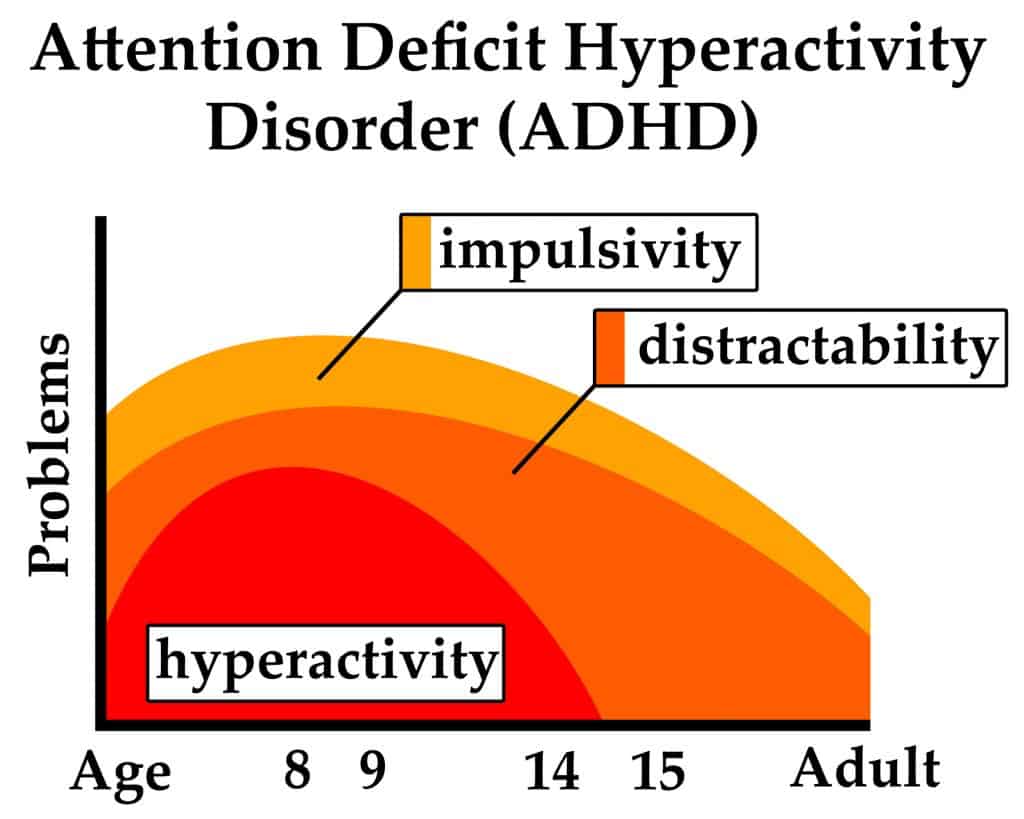Does ADHD Get Worse With Age? a Guide on What to Expect
Posted by Prescription Hope - See Editorial Guidelines (Last Updated On: Mon Jul 10 2023)
Perhaps you’re getting older now, and along with having ADHD, you’re thinking the condition may be getting worse with age. So in this article, we’re addressing the question, does ADHD get worse with age?
Let’s get started with a quick take-away answer.
Does ADHD Get Worse With Age? ADHD is an impairment of one’s brain function and cognitive abilities. There is no evidence that suggests ADHD gets worse with age. However, changes in your daily routines and habits can affect your ADHD symptoms. For example, older adults may retire, which causes them to lose a grip on the routines they once had, causing ADHD to get worse.
Now let’s get into more detail on this subject to help you understand further.

Does ADHD get worse with age?

To begin with, adult attention deficit disorder, also known as ADHD, has become a common health condition in recent times and has been diagnosed in greater numbers.
As a generation of the population diagnosed with this condition gets older, science has yet to catch up to research this area. As a result, there is no current conclusive research or studies on how aging impacts this condition.
However, the general belief in this regard is that ADHD symptoms can become more problematic with aging or post-retirement. However, this does not necessarily have to do with biological changes but rather an increased demand for attention for tasks and lifestyle changes.
Why doesn’t aging impact ADHD
ADHD is not like many physical illnesses and diseases. For example, aging can have a negative impact on heart-related conditions.
ADHD, on the other hand, is an impairment of brain functions that can cause difficulties in concentrating on tasks.
It is important to mention here that some level of cognitive decline is expected as you age. However, this is unrelated to ADHD symptoms.
ADHD is an impairment
ADHD impairs an affected person’s ability to perform certain functions. These are mainly based on functions that an individual is expected to perform at their current age or grade.
For example, a child with ADHD in fourth grade may be unable to independently perform a task as every other child does in the class.
This same child may have performed the assigned task when they were in first grade, though. The trouble they are having in fourth grade does not mean their ADHD is getting worse.
The reality is that there is an increased demand for focus and concentration in the fourth grade, and the demand placed on that child is greater than their mind will allow.
A child finds it difficult to meet the attention and self-control required and expected for their specific age. The same applies to adults.
So, when people believe ADHD gets worse with age, this is down to the fact that the person’s executive function or ability to manage themselves has not developed enough to meet the expectations of that age.
Related: Medication Available for ADHD

Why people believe ADHD gets worse with age
As a child gets older, their family, friends, teachers, and the wider community sets bars and expectations as to how a person should demonstrate adequate self-management, control, focus, and attention.
And when a person with ADHD cannot meet these bars set for each age, as other people of a similar age do, it can seem as though the person’s ADHD must be the main factor. Therefore, it can appear that ADHD gets worse with age.
The roots of this belief are from people thinking that a person with ADHD is behind their development of the medical condition, not understanding that it’s an impairment that cannot be made better or worse.
The next logical question you might ask is, if age is not a factor, what factors can make a person’s ADHD symptoms more problematic?

It is believed that anxiety, depression, mood disorders, and compulsive behaviors can worsen one’s ADHD symptoms.
Faculties that worsen with age regardless of ADHD symptoms
As humans, we go through various physical and biological changes as we grow older – both for females and males, with or without ADHD.
Brain imaging studies have shown an age-related decline in various areas of the brain that provide infrastructure for the brain’s executive functioning. This has been found even in healthy adults without ADHD.
Some of these elements include the following:
A decline in dopamine activity
According to a study, a 6.6% decrease of dopamine transporters was found per decade of life in healthy volunteers.
Besides this, an age-related decline in dopamine activity in healthy patients was also observed in several regions of the brain. This factor is important for effective brain functioning.
Effective brain functioning is essential to handle ADHD symptoms like lack of self-management, focus, attention, thinking, problem-solving, and so on.
Drops in estrogen levels during menopause for women
This is an age-related factor for most women. During menopause, your estrogen levels drop by as much as 65%.
This drop, in turn, can reduce dopamine production that is essential for the effective functioning of the brain.
During a menopausal stage and related hormonal effects, ADHD symptoms could become heightened and more problematic with age.
But again, this effect on menopause is something many women will encounter regardless of an ADHD condition.
Related: Does Estrogen Affect Blood Sugar?
White matter in the brain decreases
White matter decreasing in the brain is also associated with the aging population in general and not just with ADHD.
White matter makes up most of the brain content, and you can lose a lot of it with age. It’s this white matter that helps you focus on and solve problems.
White matter is found in the deeper tissues of the brain (subcortical) and contains nerve fibers (axons), which are extensions of nerve cells (neurons).
According to a study, it was found that white matter fibers reduce by 10% per decade of life for the general population. This decline adds up to 45% on average by 80 years of age for everyone, regardless of having ADHD or not.
White matter has been found to be crucial for learning and mental function. So, if white matter declines, the ability to focus reduces. Those with ADHD may experience the compounding effects of this.
Degenerative processes of aging or early stages of dementia
Degeneration refers to the process by which tissue deteriorates and loses its functional ability because of reasons such as traumatic injury, wear and tear, and aging.
When this degeneration comes with aging, it weakens the specific brain network, the locus coeruleus that controls our ability to focus while under stress.
This will likely interfere with your ability to focus, attention, memory, and alertness. As such, when these combine with ADHD, the symptoms can eventually worsen.
This same effect occurs with dementia or the early stages of dementia as we age.
Dementia, in short, equates to a loss of memory, problem-solving, language, and even thinking abilities, which can dramatically impede cognitive function and daily life.
As dementia combines with ADHD symptoms, it can worsen ADHD further with age.
Related: Can You Prevent Alzheimer’s?

Closing thoughts
We hope this has provided valuable information and perhaps some confidence that your ADHD may not be getting worse but may simply be a change in your lifestyle or routine. As always, though, if you’re in any doubt, consult your doctor before taking any action.
When provided with medication to assist with this or other medical conditions, then Prescription Hope may be able to help.
For more questions regarding your specific condition, always consult your healthcare provider.
If you’re having trouble affording any of the medications you’ve been prescribed, visit our home page to learn more about Prescription Hope’s medication access service, compare the costs of your current prescriptions, and see how we can help obtain your medications at a cheaper price. Fill out an application today and start receiving Brand-Name prescription medications at your doorstep. Call us at 1-877-296-HOPE (4673) to speak to one of our representatives, we’re always happy to see how we can help.


